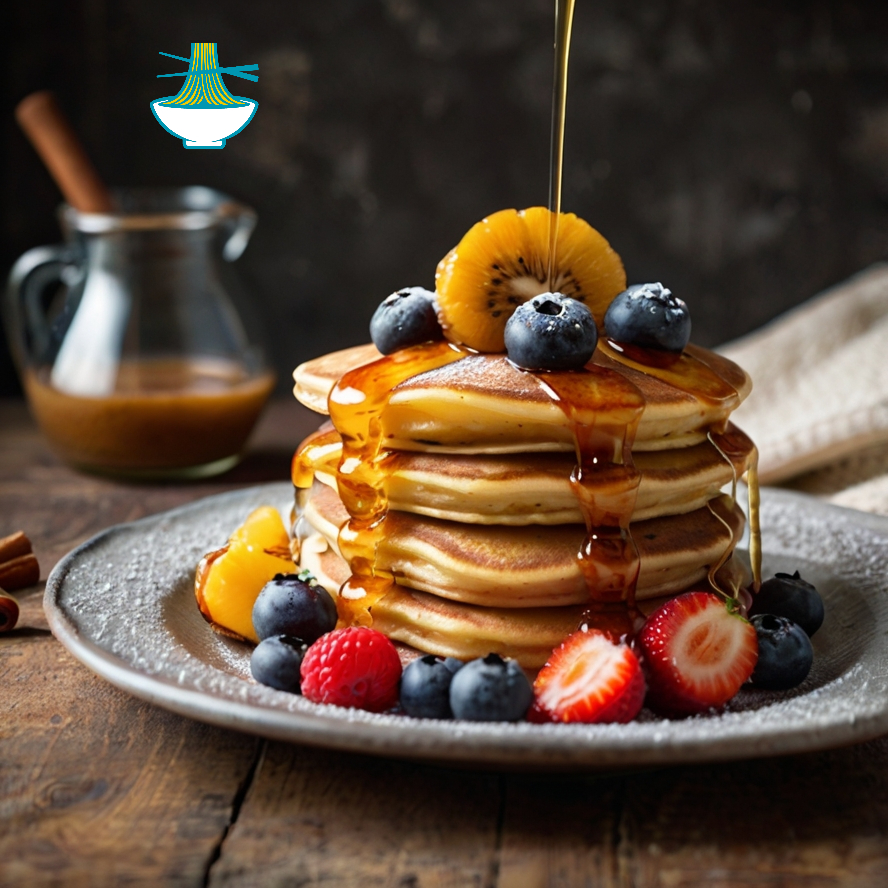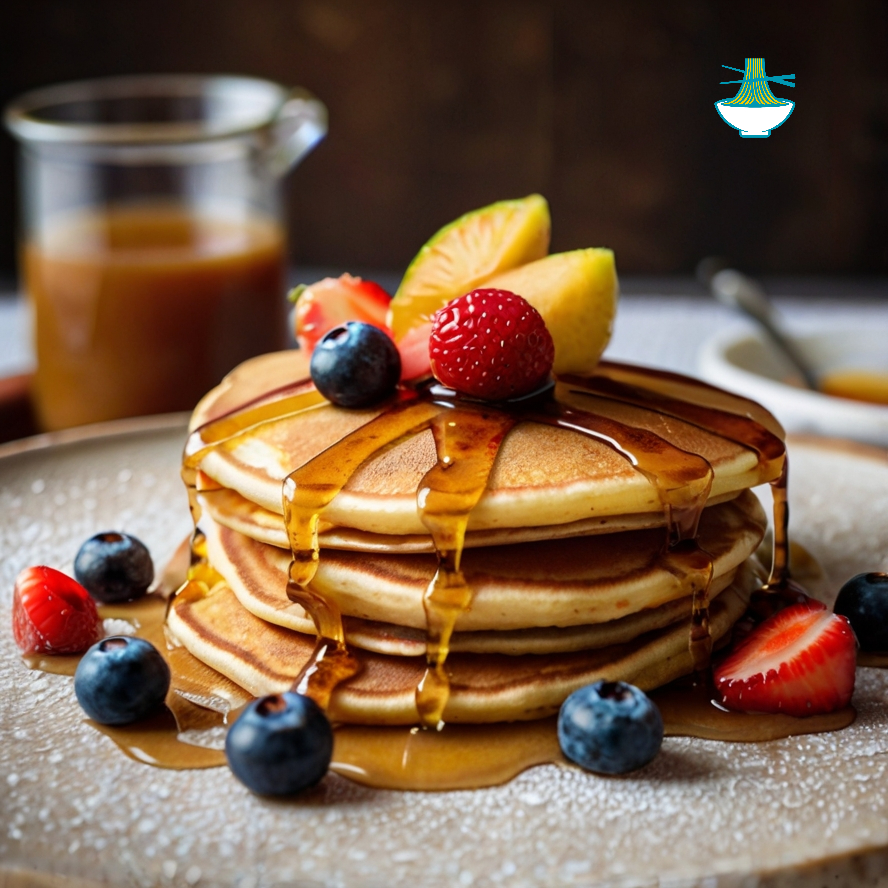Mexican Pancakes are a delightful variation of the classic breakfast recipes pancake, infused with traditional Mexican flavors like cinnamon and vanilla extract. These pancakes are typically topped with cajeta, a rich caramel sauce made from goat's milk, and often garnished with fresh fruits. The pancakes are not only a flavorful treat but also provide a good source of carbohydrates, which offer energy to start the day. While the indulgent toppings contribute to the sweetness and flavor, it's important to note that they can be high in sugar and calories. However, the use of cinnamon adds potential health benefits, such as anti-inflammatory properties and blood sugar regulation. Enjoying these pancakes in moderation can add variety and flavor to breakfast without compromising overall health.
Ingredients:
- 1 cup all-purpose flour
- 1 tbsp sugar
- 1 tbsp baking powder
- 1/2 tsp cinnamon
- 1/4 tsp salt
- 1 large egg
- 3/4 cup milk
- 1 tsp vanilla extract
- 2 tbsp melted butter
- Cajeta (caramel sauce) or fresh fruit for topping
Instructions:
- Prepare the Dry Ingredients: In a large bowl, whisk together the flour, sugar, baking powder, cinnamon, and salt until well combined. These ingredients will form the base of your pancake batter.
- Mix the Wet Ingredients: In a separate bowl, beat the egg until smooth. Then, add the milk, vanilla extract, and melted butter to the egg. Stir thoroughly to ensure all the wet ingredients are fully incorporated.
- Combine Wet and Dry Ingredients: Gradually pour the wet ingredients into the dry ingredients, stirring gently with a wooden spoon or spatula. Be careful not to overmix – the batter should be slightly lumpy, which ensures your pancakes are light and fluffy.
- Heat the Cooking Surface: Place a non-stick pan or griddle on medium heat. Lightly grease the surface with butter or a small amount of oil to prevent sticking and to give the pancakes a nice golden-brown color.
- Cook the Pancakes: Pour approximately 1/4 cup of batter onto the heated pan for each pancake. Allow the batter to spread naturally into a circular shape. Cook for about 2-3 minutes on one side. You’ll know it’s time to flip when small bubbles start to form on the surface of the pancake. Flip the pancake and cook for another 1-2 minutes until golden brown on both sides.
- Serve the Pancakes: Once cooked, remove the pancakes from the pan and place them on a plate. Serve immediately while warm, topped with cajeta (caramel sauce) or fresh fruit such as bananas, berries, or mangoes for added sweetness and flavor.
Enjoy your delicious, fluffy pancakes!
How to Prepare Cajeta (Caramel Sauce):
Cajeta is a rich caramel sauce traditionally made from goat's milk, offering a distinct flavor compared to regular caramel sauces. If it's not available in stores, you can make it at home with the following ingredients:
Ingredients:
- 2 cups goat's milk
- 1 cup sugar
- 1/4 cup brown sugar
- 1 tbsp vanilla extract
- 1/2 tsp cinnamon (optional)
- 1/4 tsp baking soda
Instructions:
- In a saucepan, combine the goat's milk, sugar, and brown sugar.
- Heat over medium heat while stirring constantly until the sugar dissolves.
- Once the mixture starts to simmer, reduce the heat and continue to cook for 45-60 minutes, stirring occasionally, until it thickens to a syrup-like consistency.
- Add vanilla extract and cinnamon, stirring well to combine.
- Stir in the baking soda, which will cause the mixture to foam. Let it cook for another 5-10 minutes, then remove from heat.
- Allow the cajeta to cool before using it as a topping for pancakes or other desserts.
Tips for Perfect Pancakes:
- Achieving the Right Texture: To make your pancakes light and fluffy, ensure that you don’t overmix the batter. A few lumps are fine, as overmixing can lead to dense pancakes.
- Making Pancakes Crispier or Softer: To make pancakes crispy on the outside and soft inside, you can increase the amount of baking powder or use a mix of milk and water to make the batter thinner.
Healthy Alternatives and Suggestions:
- Whole Wheat Flour Substitute: Instead of regular all-purpose flour, you can use whole wheat flour to add more fiber and nutrients to the pancakes. However, you may need to adjust the liquid ratio in the batter as whole wheat flour tends to absorb more moisture.
- Natural Sweeteners: You can replace sugar with healthier alternatives like honey, maple syrup, or stevia to reduce the glycemic impact of the pancakes.
- Healthier Fat Options: Use healthier fat alternatives such as coconut oil or avocado oil instead of butter to reduce saturated fats and enhance the nutritional profile of the pancakes.
Additional Serving Ideas:
- Add Fresh Fruit and Nuts: Besides the traditional cajeta topping, you can top your pancakes with fresh fruits like berries, bananas, or mangoes. Adding nuts like almonds or walnuts can provide a nice crunch and additional protein.
- Low-Fat Yogurt: For a creamy twist, serve the pancakes with low-fat yogurt instead of heavy cream or whipped cream. This adds probiotics and reduces the overall calorie content.
Note:
Sugar Consumption Alert:
- Given that the pancakes and cajeta topping both contain sugar, it’s important to consume them in moderation. Overindulgence in sugar can lead to weight gain and other health issues like high blood sugar and diabetes. Balancing the sweetness with fresh fruit or reducing the sugar content can help make this breakfast a healthier option.
Frequently Asked Questions (FAQs):
Can whole wheat flour be used instead of regular flour?
- Yes, whole wheat flour can be used as a healthier alternative to all-purpose flour. However, you may need to adjust the liquid ratio, as whole wheat flour tends to absorb more moisture than regular flour.
Can pancakes be made without eggs?
- Yes, eggs can be replaced with alternative ingredients such as mashed bananas, ground flaxseeds mixed with water, or even chia seeds to maintain the structure and texture of the pancakes.
Can I reduce the sugar or replace it with other sweeteners?
- Absolutely! You can replace sugar with natural sweeteners like honey, maple syrup, or stevia. These alternatives can help reduce the glycemic impact of the pancakes and make them healthier.
Can pancakes be prepared in advance?
- Yes, pancakes can be made ahead of time and stored in the refrigerator or freezer. Just reheat them in the microwave or on a hot griddle when ready to serve.
How can I make pancakes crispier?
- To make pancakes more crispy, you can increase the amount of baking powder or use a combination of milk and water in the batter to make it thinner. Additionally, cooking the pancakes on medium-high heat will help them become crispier on the outside while remaining soft inside.

Nutritional Values and Benefits:
All-Purpose Flour (1 cup)
- Calories: 455
- Carbohydrates: 95g
- Protein: 13g
Nutritional Benefit: : Flour provides a good source of carbohydrates, which give the body energy. It also contains some protein to support muscle function.
Sugar (1 tbsp)
- Calories: 49
- Carbohydrates: 12g
Nutritional Benefit: Sugar adds sweetness and provides a quick energy source. However, it should be consumed in moderation due to its high-calorie content.
Baking Powder (1 tbsp)
- Calories: 6
Nutritional Benefit: Baking powder helps the pancakes rise and become fluffy, but it provides little nutritional value.
Cinnamon (1/2 tsp)
- Calories: 3
Nutritional Benefit: Cinnamon is rich in antioxidants and has anti-inflammatory properties. It may also help regulate blood sugar levels and improve heart health.
Salt (1/4 tsp)
- Sodium: 580mg
Nutritional Benefit: Salt helps maintain electrolyte balance, though it should be consumed in moderation to avoid excessive sodium intake.
Egg (1 large)
- Calories: 72
- Protein: 6g
- Fat: 5g
Nutritional Benefit: Eggs provide high-quality protein, vitamins like B12, and minerals such as iron, supporting muscle health and overall body function.
Milk (3/4 cup)
- Calories: 75
- Protein: 4g
- Calcium: 276mg
Nutritional Benefit: Milk is an excellent source of calcium, essential for bone health. It also provides protein and other vitamins and minerals for overall well-being.
Vanilla Extract (1 tsp)
- Calories: 12
Nutritional Benefit: Vanilla extract adds flavor and contains trace amounts of antioxidants that can help fight oxidative stress.
Melted Butter (2 tbsp)
- Calories: 200
- Fat: 22g
Nutritional Benefit: Butter provides a rich, flavorful fat, but it should be used in moderation due to its high saturated fat content.
Cajeta (Caramel Sauce, 1 tbsp)
- Calories: 60
- Carbohydrates: 16g
Nutritional Benefit: Cajeta adds a rich, sweet flavor to the pancakes and contains small amounts of calcium from the goat’s milk used to make it.
Health Benefits of Ingredients:
- Cinnamon: Rich in antioxidants, cinnamon has anti-inflammatory properties and may help regulate blood sugar levels. It also contributes to heart health by improving cholesterol levels and circulation.
- Eggs: Eggs provide high-quality protein, vitamins like B12, and essential minerals such as iron, which are crucial for muscle health and overall body function.
- Milk: An excellent source of calcium, milk helps promote strong bones and teeth. It also provides protein and other vitamins like vitamin D and B12.
- Vanilla Extract: While primarily used for flavor, vanilla extract contains trace amounts of antioxidants that may help reduce oxidative stress in the body.
Additional Nutritional Information:
- Saturated Fat in Butter: Butter is high in saturated fat, so it’s best to use it in moderation. For a healthier option, you could opt for unsalted butter or a plant-based butter substitute like almond butter.
- Cajeta's Nutritional Benefits: While cajeta adds a sweet flavor, it’s important to note that it’s high in sugar. To reduce sugar intake, consider using it sparingly or replacing it with fresh fruit.
Mexian Pancakes offer a flavorful twist on the traditional breakfast, with a delightful combination of cinnamon, vanilla, and sweet toppings. While they provide essential carbohydrates and some protein, it's important to enjoy them in moderation to avoid excess sugar and calories.


Comments